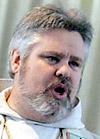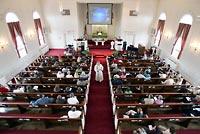Support of gay marriage sparks division in church

TOLEDO, Ohio — When the last votes were counted, some members of Pilgrim United Church of Christ hugged and applauded the decision to end their 45-year affiliation with the denomination. Others wiped away tears and walked out in protest.
The United Church of Christ's endorsement of same-sex marriage — a lone stance among the largest Christian denominations — has stirred debate and divided dozens of its congregations. Some have stopped sending money to the church's national office; others have left the denomination.
"It has caused people to really think hard about their faith," said the Rev. Stephen Camp, administrator of the UCC's Southern Conference.
"We're on the right side of history," said Camp, who backs the denomination's position. "We're seeking to be faithful to what Jesus Christ is saying, that we should all be one."
With about 1.3 million members, the Cleveland-based church has a tradition of support for gays and lesbians, in 1972 becoming the first major Christian denomination to ordain an openly gay minister.
Some conservative congregations, however, were angered by a UCC television-advertising campaign to reach out to gays. Some of those same conservatives say church leaders crossed the line when the General Synod — the largest church body — endorsed same-sex marriage last July.
That "isn't what we preach, it isn't what we teach, it isn't what we believe," said Lawrence Cameron, the pastor at Pilgrim UCC.
It's not clear how many congregations have left the denomination since last summer. The UCC puts the number at 49, while a group opposed to the stand on marriage says it's at least 77. Either number represents just a fraction of the UCC's 5,725 congregations.
In the Pacific Northwest Conference, which has 80 congregations in Washington and Northern Idaho, no congregation has left over the issue so far, said the Rev. Mark Miller, interim conference minister.
"We have only had a couple of congregations where some individuals within the church have raised negative concerns, Miller said. "But I would say in a very strong way our Pacific Northwest Conference would be supportive of same-gender marriage."
Although the number of congregations that have left is small, the same-sex marriage issue has sparked debate and divisiveness — especially in the South and Midwest.
Members of the church in eastern Pennsylvania have spent time at retreats debating whether to remain in the denomination and fight against the policy or start anew. For now, they won't give any money to the denomination, sending it to orphanages or other charities instead, said Bryan Moore, pastor at Shepherd of the Hills Church in Bechtelsville, Pa.
Other churches are sticking around to fight.
About 30 congregations are part of a group called Faithful and Welcoming Churches of the United Church of Christ, which is planning a three-day national gathering this July in Columbus, Ohio.
"By emerging from obscurity, we can affect the agenda of the national church," said Bob Thompson, pastor at Corinth Reformed Church in Hickory, N.C. "Christians that differ should be able to stay together and work together."
United Church of Christ leaders say they grieve the loss of any church but add that most of the churches that left were distancing themselves from the denomination in recent years, including some that had been withholding money.
The church says 23 new congregations joined last year, some because of the gay-marriage decision. That issue, though, does not define the UCC, said Barb Powell, a spokeswoman for the UCC.
"We knew that going in there was going to be a need for broad discussion," she said. "I don't think it's really a distraction. One issue won't shape any denomination."
The church's national office said it hasn't noticed a significant drop in donations that support its operations. The Southern Conference, however, has felt the impact of fewer donations in recent years, forcing it to cut staff positions and reduce scholarships for seminarians, Camp said.
Individual UCC congregations make their own decisions on whether to accept recommendations from church leaders and can decide whether to withhold money from the national office. They also own their own buildings, which makes it easier for them to leave the denomination and look for a new church to join. In 2001, church officials said more than 300 congregations had quietly left the denomination over the previous decade.
Members of Pilgrim Church in Toledo spent two months debating whether to stay in the UCC before voting twice on the question. The second vote, taken in January, was 156-77 in favor of leaving — just the required two-thirds majority needed.
Seattle Times reporter Janet Tu contributed to this report.
